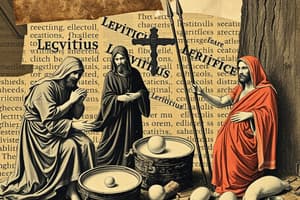Podcast
Questions and Answers
Match the following terms with their corresponding definitions:
Match the following terms with their corresponding definitions:
Canon = Authoritative collection of books (ex.Bible) Canonization = The process by which books are selected to be part of the canon Septuagint = Best Greek Translation of the Hebrew bible - (The Old Testament) Vulgate = The best known Latin Translation of the bible
Match the following biblical figures with their respective historical periods:
Match the following biblical figures with their respective historical periods:
Herod the Great = 4 BCE - 30 CE Paul (Called Saul by mother{It is his jewish name}) = 50 - 64 CE Pontius Pilate = 4 BCE - 30 CE Emperor Domitian = The 90’s CE
Match the following events with their approximate dates:
Match the following events with their approximate dates:
Roman Jewish War = 66 - 70 CE Temple is Destroyed + Jerusalem = 70 CE Lifetime of Jesus of Nazareth (The Messiah) = 4 BCE - 30 CE Worldwide Persecution of the Church 2 = The 90’s CE
Flashcards
Canon
Canon
An authoritative collection of books, like the Bible.
Canonization
Canonization
The process by which books are selected to be part of the canon.
Vulgate
Vulgate
The best-known Latin translation of the Bible.
Incarnation
Incarnation
Signup and view all the flashcards
Christology
Christology
Signup and view all the flashcards
Study Notes
Key Terms & Definitions
- Cannon/Canonical: An authoritative collection of books (e.g., the Bible).
- Canonization: The process of selecting books for inclusion in the canon.
- Septuagint: The best Greek translation of the Hebrew Bible (Old Testament), featuring rearranged order and added books (used by Roman Catholics and Greek Orthodox).
- Evangelion: An early form of the word "Gospel," meaning good news.
- Literary Genre: A category of literature (e.g., gospel).
- Kerygma: The oral message (preaching) of faith.
- NT Manuscripts: Copies of the New Testament. We don't have the originals; comparing manuscripts helps determine the closest version. Shorter manuscripts are more likely to be closer to the original.
- Vulgate: The most well-known Latin translation of the Bible.
- Incarnation: The Christian doctrine that God's son took human form as Jesus Christ (100% divine, 100% human).
- Messiah (Hebrew): The anointed one (primarily by God).
- Christos (Greek): The anointed one (primarily by God).
- Christology: The study of Jesus Christ (derived from theology, the study of God).
Key Dates & Events
- 4 BCE – 30 CE: Lifetime of Jesus of Nazareth (the Messiah).
- 50 – 64 CE: Paul's ministry as an apostle; he wrote letters (Paul's early life: prosecution, Apostle then Letters)
- 66–70 CE: Roman-Jewish War; destruction of the Temple and Jerusalem (in 70 CE, Matthew and Mark and Luke -Acts).
- 70 CE: The setting for Mark's Gospel, using the destruction of Jerusalem to solidify the reality of God (apocalyptic context).
- 85 CE: "Cursed vs. Heretics" era; split between Judaism and Christianity (excommunication). Matthew, Luke-Acts appear.
- 90s CE: Worldwide persecution of the Church (Emperor Domitian). Gospel of John and Revelation written.
Additional Notes
- Important Manuscripts: Determining the most accurate NT version involves comparing various copies (manuscripts). Shorter manuscripts are often more likely to represent the original text.
Studying That Suits You
Use AI to generate personalized quizzes and flashcards to suit your learning preferences.




